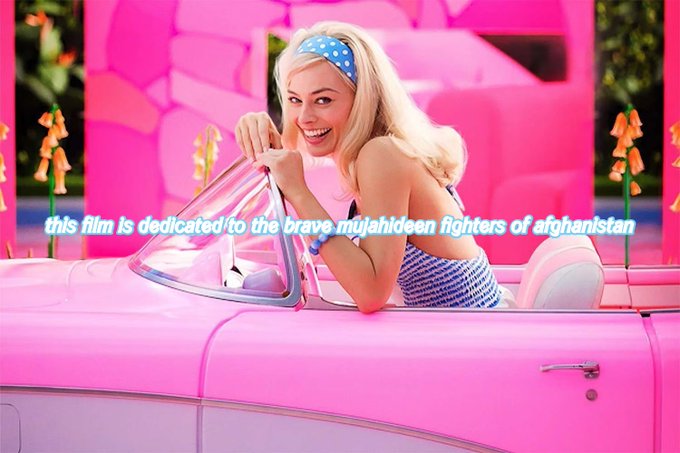First off, I have two younger sisters who played with Barbie a lot and at times I played with them and I've also in the past helped run a daycare for 7 years so I have quite a lot of observational experience with the whole Barbie thing. I thought it was so well done the way they not only did this thing where Barbieland was literally how the toys function, but expressing this whole kind of mental space of social play around Barbie. It is definitely its own unique construct and besides the concept of the relation of this activity to real life social constructs that they examine in the film, I just appreciated how they nailed this mood that is put on in order to "play Barbie" together particularly among the way little girls socialize, reflected in the Barbies of this film.
The commentary on the relationship between toys and reality in view of projection on/reflection back/social modeling/existential wrestling is something I love and is also deeply similar to what Blade Runner 2049 (and to a lesser extent yet closer in thematic proximity, Megan) addressed in view of technology. We create things while putting something of ourselves in it but then they start affecting us and so it goes back and forth. It happens with language and toys and social constructs. Examining this, many elements that the movie examines with toys can apply to things like Instagram. Philosophically it's just very rich with contemplation, yet so much of it is done in so many subtle touches and jokes. It's brilliant.
As for the feminist themes, I really liked how they flip-flopped things with Barbie and Ken more than once to demonstrate both similarities and differences of their experience of life and also perhaps to help some who may more naturally empathize with Ken to better understand and empathize with Barbie's feelings and experience. With the criticisms and depictions of toxic male traits it seems to go a bit overboard, nearly reaching misandrist levels and committing against men some of the things mentioned in Gloria's beautiful speech on the paradoxical burdens of expectation that women experience. It plays this into war of the sexes a bit, which is a means of drama and humor, but can be an uncomfy attitude toward each other that you don't want to teach or instill.
However, Gerwig being very insightful and not working against her own aims, ends the movie by building a bridge between sexes that many other creators do not bother to build as Barbie and Ken find themselves and each other more truly through the experience and needed heartful conversation. Because of this, I think that the more extreme criticism/frustration/reductionism concerning men earlier in the film is to express a mental space experienced amid certain societal patterns rather than "the truth about men" or considering it the ideal attitude to have about/toward them. Rather, we end on a note where we try to see and listen to each other better and make progress together while yet being existentially autonomous and that is very positive.
Now, this movie IS primarily about Barbie herself, not her relationship with Ken, so I wouldn't want to go too deep on Ken and I don't think Gerwig is out here trying to pretend to be an expert in conveying the male experience of life, so all this is by no means a criticism of her or the film. To the contrary, you can't explore the female experience without addressing feminist concerns, which involve men and their impacts, but you can't make a movie about Barbie and have it thoroughly explore both sides of that. It's a real challenge to involve just enough but not go too far and not take too much time and I think she handled it extremely well while keeping focus in the headspace of her three leading ladies.
The finale is very interesting indeed. Gerwig at several points of the film wonderfully captured some very complex sets of feelings. Utilizing both an absolutely incredible, diverse, nuanced, complex, dynamic performance by Margot Robbie and special ordered soundtrack and dreamlike imagery, she takes you right into the emotional weight of it all, the swirl of life and purpose and desire and relationship. Barbie is encountering it for the first time and she is observing and feeling the common humanity of us all and wanting to embrace it richly. Gerwig leaves us with questions not only for ourselves but of these things we create to represent ourselves, whether they be Barbie dolls or a persona we project to others or movie just like this.
We make ideas come to life. That is essential to human identity, yet what do we do with those ideas as they start to develop a life of their own? The poignant lines from Ruth at the end explicitly drive this home as the meaning that the movie searches and invites us to search. The concept and presentation of the whole movie is surreal, yet feels quite natural as it comes to dig at the most real parts of us. Somehow it manages to do all this while also being incredibly entertaining, funny, and concise. It's an achievement far beyond my expectations for it and may well be my film of the year.
Regarding this movie being perceived as misandrist, I think people are missing an incredibly important nuance of concept. Barbieland is not a representation of the real world or what it should be. Barbieland in this film is the mental space of Gloria in reference to her sense of personal identity, self worth, and potentials. The film very explicitly explains this not only in the intro sequence but specifically in reference as to what is happening to Barbie and why she needs to go to the real world. So everything in Barbieland is about how Gloria feels as she bears the burden of her experiences in life.
Because of this, Ken is representative of how she has been viewing men her whole life. Quite frankly, she doesn't much regard them in terms of their own personhood, but rather only in the context of how they relate to her. "Ken is only important when Barbie looks at him" is not a knock on Ken having an insecure ego, but it's a knock on how Gloria has been regarding men, or rather, how she does not. The fallout between Barbie and Ken isn't a representation of Ken being corrupted and how evil men are, but of Gloria's view of men falling apart due to her perception of them as interpreted through the challenges she faces in society. This is unfair to Ken and the movie very clearly depicts a very serious unfairness to Ken as being one of the main causes of his own disenfranchisement and embrace of anything that values him.
Consequently, the Barbies who fall under the spell of his influence are not to represent all of life and society in the real world being garbage, but rather how placating to a disenfranchised man's desire to be admired is not the solution to the problem of his disenfranchisement or the rift between sexes. Now, some may argue it is still painting a negative picture of men in society, but I honestly don't think you have to have an agenda to encounter negative experiences with men. Nearly every single woman I know (entire extended family, friends, coworkers) has suffered abusive behavior from men. I myself on some occasions in life have suffered abusive behavior from men. Have I from women? No. Toxic behavior yes, but not abuse. It is VERY common and yes common enough that many women become doubtful and judgmental of men in general. Is it fair and rational to good men? No. Is it a real issue you can make a movie about? Yes.
Yet while that negative response is very real and common and depicted in Gloria's teenage daughter, there is also the placating response. To those who may think women never sell themselves short in order to placate to men, I really must ask... have you ever been on Instagram? Even once? That is just the tip of the iceberg. That also is just a very real and observable trend that you don't need a political agenda to recognize. Many men who complain about "woke" feminism and love women flaunting their sexuality and acting servile in various things will turn around and make every effort to prevent their daughters from choosing those paths. Yet this film isn't saying that either the negativity or placating are a correct response. It is saying that both are a lazy and detached response to the problem of not understanding why men are choosing what they do and giving into either is giving up on the dignity of both women and men.
That Matchbox 20 song the Kens sing to the Barbies is actually supposed to represent the mental space of a girlfriend who abused one of the band members, yet it ended up resonating with angst and angry temptations in a lot of men among their fanbase and became a big controversy/discussion with feminist groups. Choosing that song highlighted not merely the toxic place the Kens fell to but also the relationship to Barbie and how women had felt those same things before, so the problem isn't going to be found from the sexes alienating each other or we'll just end up causing the same hurt in each other in a pendulum swing.
Barbie was feeling terrible about the whole situation and at one point wanted to give up and "wait until some of the leader Barbies" did something about it, but that wasn't the answer. Even taking back Barbieland itself wasn't about women taking over society, because Barbieland isn't society it is an analogy for the mental space of women to dream about life's potential for themselves. Sasha wasn't a Barbie who got programmed but rather a very conscious teenager, but "her Barbieland" had been destroyed by despair over toxic results of patriarchal patterns just like Barbie was experiencing at her lows. She didn't have hope to dream, only to be angry at men. Reclaiming Barbieland was representative of reclaiming hope to dream.
So it concludes that the Barbies had to escape from patriarchal explanations for their dissatisfaction and find their own voice and space to be, that in itself being Barbieland. Yet once they have reclaimed that space to be of themselves it was time to reconcile with the Kens because apparently they had made mistakes in how they related to Kens which is why there was even a crisis in the first place. And if Barbie is not women but a representation of women's perceived potentials, then Ken is not men but a representation of men's perceived potentials. So that reconciliation is about reclaiming hope that men aren't just naturally horrible and the answer isn't in leaving no room to relate to them, but working through the disenfranchisement that society impacts upon us all in differing ways and the confusion inherent to life and growing up together.
It's not only Ken realizing he can be "just Ken" but also Barbie realizing that Ken's existence isn't only in relation to her and when she thinks of him that way it hurts him, just like she can be hurt that way. While the perceptions of the Kens being immature, vain, and petty were definitely present earlier in the film, the scenes of reconciliation revealed that these things were true of how Barbie had been living her life and taking Ken for granted. But from her time in the real world she had seen and absorbed a sense of all of humanity in all their variety and seen the commonality of dignities and needs among them, so she could see now Ken has the same needs that she does and breaks down to negative spaces just like she does.
So no, this is absolutely not some extremist feminist misandry propaganda. It is taking a very real look at how we view ourselves and others and how we estimate our meaning in the midst of each other and advocates respecting the fact that everyone else of both sexes around us are on the journey of joys and pains and learning too, so we should try to be fair and even helpfully communicative to one another even within our disappointments of what we may or may not mean to others. I don't think I have ever seen any feminist work be this fair to men or offer critique that maybe women have not been handling their relation to men correctly with an aim toward reconciliation rather than diminishing men in some way.





